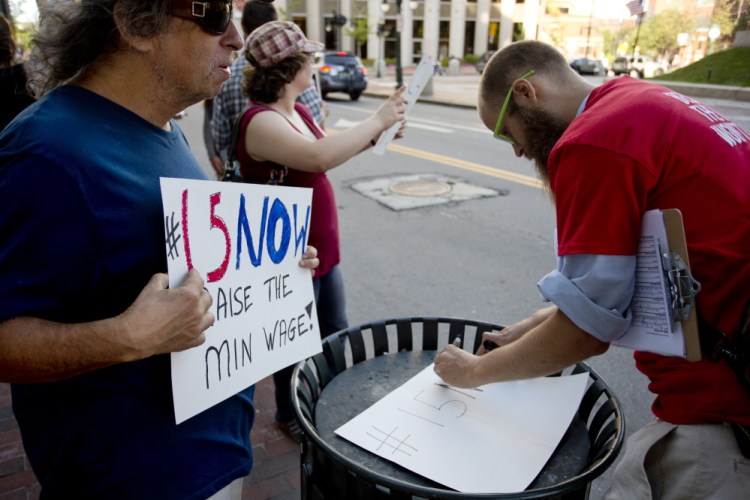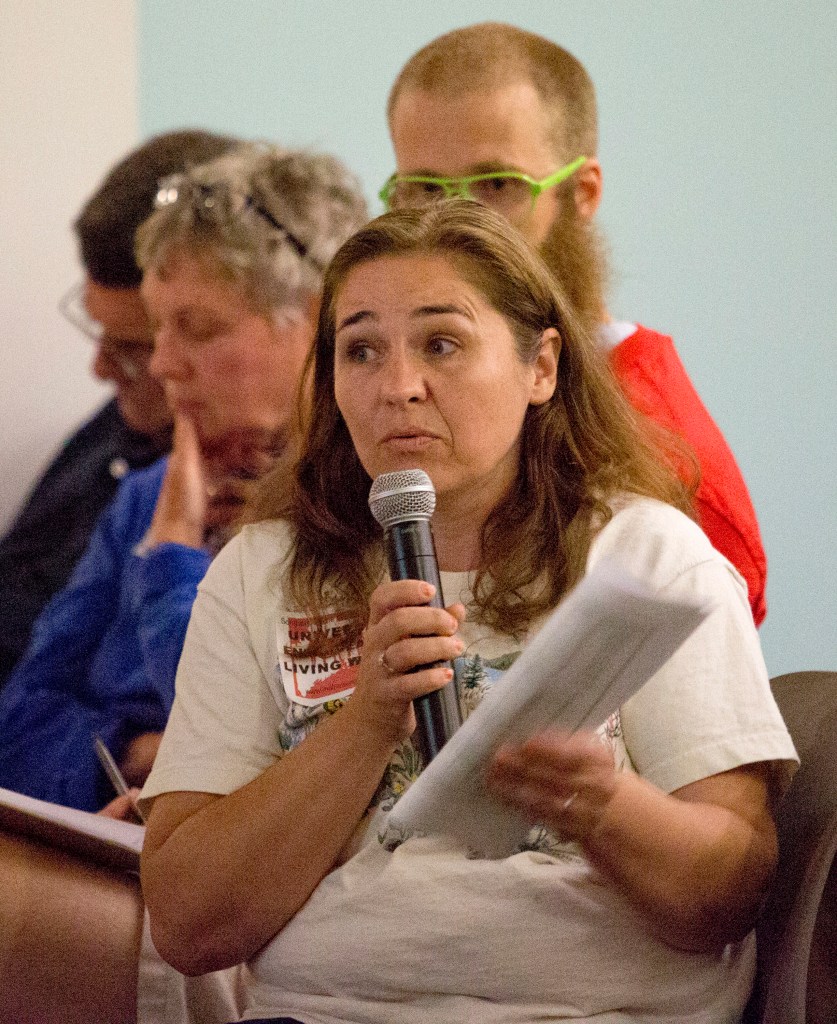A proposal to raise Portland’s minimum wage evoked strong emotions Wednesday evening, with some speakers urging city officials to double the current wage to $15 an hour while restaurant owners cautioned against drastic changes that could undercut a key driver of the city’s tourism economy.
More than 100 people attended a forum organized by Portland Mayor Michael Brennan and members of his Minimum Wage Advisory Group, which has spent five months examining the benefits and implications of a local wage increase. The group was formed in response to political gridlock over the issue at the state and federal level.
Brennan has yet to make a formal proposal to the Portland City Council. But the current draft of his plan would begin with a $2 wage hike – from the state minimum $7.50 to $9.50 an hour – next year followed by increases to $10.10 and $10.68 an hour in the two subsequent years. After that, Portland’s minimum wage would be pegged annually to cost-of-living increases.
Brennan said he hopes to present the plan to the City Council in September or October. The council will then refer the matter to a committee.
Few in the crowd opposed a minimum wage increase in a city whose burgeoning national reputation has been accompanied by rising rents and increasing financial pressure on the city’s social services programs.
Karen Cairnduff tearfully recalled working full time yet still having to seek help from social services to support her family because the minimum wage did not cover the bills. Even though she and her husband work full time, Portland’s rising rents recently prompted her family to move to a neighborhood where she no longer feels comfortable allowing her young daughter to play outside.
“We are in the slums because we moved out of a nice neighborhood,” she said.
Numerous speakers said $9.50 or even $11 an hour would not be high enough and, instead, called on Portland to adopt a “living wage” sufficient for a worker or family to meet basic needs such as food and housing without other support.
“There is no excuse for anybody working a full-time job to be living in poverty and to need welfare, to need food stamps,” said Portland resident Michael Anthony, one of more than a dozen members of the New England chapter of the organization 15 Now that is pushing for a $15-an-hour minimum wage.
Business representatives argued that a minimum wage hike is best handled at the state or federal level to avoid local disparities. But it was Portland’s booming restaurant scene that sparked the most debate, even if it appeared that much of the restaurant owners’ concerns had may have been misplaced.
More than a half-dozen restaurant owners – from large establishments such as DiMillo’s to small pubs – warned Brennan not to eliminate the “tip credit” that allows establishments to pay food servers, bartenders and others 50 percent of the minimum wage on the assumption that tips will cover the rest. Federal law requires restaurants to pay the full minimum wage when tips fall short, however.
“If you take away the tip credit, I will not be able to offer health (insurance), dental and 401ks anymore,” said Michelle Corry, owner of the restaurants 555 and Petite Jacqueline. “This is a fact. Things like that you need to consider.”
Noah Talmatch, owner of The North Point, said he voluntarily pays all of his 43 workers higher wages “because the reality is nobody could possibly survive on the current minimum wage.” Talmatch said many of his servers earn $25 to $30 an hour after tips. But requiring him to pay all tipped employees $9.50 an hour would force him to lay off employees and raise prises.
“Every restaurant in Portland will be forced to do the same,” he said.
Brennan said afterward, however, that the advisory group has “never” considered eliminating the tip credit, though restaurants would be required to pay 50 percent of the higher minimum wage.
Jim Grattelo, owner of the Joker’s Family Fun & Games in Portland, does not oppose raising the minimum wage, but urged Brennan and the advisory group to consider re-instituting a “student wage” that allows employers to pay less to minors. Grattelo said he pays 21,000 hours worth of wages a year to employees who are under age 18. Raising the minimum wage to $9.50 an hour and then $10.10 an hour would cost him $42,000 and $63,000, respectively, he said.
Grattelo is currently holding off on signing a new lease until he sees what happens with the minimum wage in Portland.
“This would be a deal-breaker for our business,” he said. “This is an example of unintended consequences … and I am one of the businesses that would have to close our doors because of this.”
It is unclear how many workers in Portland earn the minimum wage, although the number appears to be small.
A full-time worker earning the current state minimum of $7.50 an hour would earn $15,600 for the year. According to the U.S. Census Bureau, just 5 percent of Portland residents working year-round in full-time jobs earned less than $15,000 in 2012, while 17.4 percent earned $15,000 to $24,999. By comparison, roughly 13 percent of city residents working full time earned more than $75,000.
Send questions/comments to the editors.





Comments are no longer available on this story